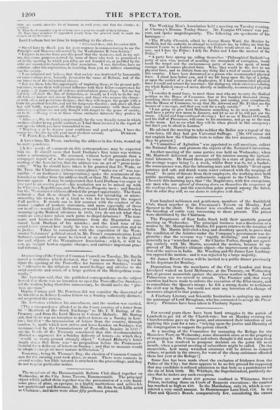At a meeting of the ('mart of Common Council, on
Tuesday, Mr. Baylis 'loved a resolution which declared, that " any measure hay ing thr its abject the opening of the Post-office for business on Sundays," would
" offensive to the religious and moral feelings and adverse to the .oeial comforts aud order, of a large portion of the Metropolitan com- nunity.
Mr. Anderton said, that the published correspondence on the subject howed that there was no intention to open the Post-officeon Sundays ; oil the motion being therefore unnecessary, he should move the " pre- -ions quost ion."
Deputy Conley and Mr. Pewtress did not consider the disavowal of he intention to deliver London letters on a Sunday sufficiently distinct; old supported the motion.
Mr. A nderton withdrew his amendment, and the motion was carried.
[The c orespondenee alluded to in the Court consists of a letter from he " Members of the Stock Exchange" to Mr. F. T. Baring, of the freasury. and front the Lord Mayor to Colonel Moberly. Mr. Baring ;aid, that there was no intention to deliver letters on a Sunday in Lon- but that " the transmission of letters front the country, through London. b... mails which now arrive and leave London on Sundays, was ..ecominvialed by the Commissioners of Post-office Inquiry in 1837 ;" and the L .rds of the Treasury considered that this recommendation tffOrtled ItA argument for a Sunday delivery of letters—to which they would wt: every ground strongly object.' Colonel Moberly's letter Imply stat,2s that there was " no proposition before the Postmaster- neneral f tr u delivery of letters on Sunday ; and that no measure would be adopts 1 except on most mature deliberation."]
Yesterday, being St. Thomas's Day, the election of Common Council- men for Vie ensuing year took place, as usual. There were contests in several wards ; but little interest is attached to the proceedings, and they do not require particular notice.


























 Previous page
Previous page